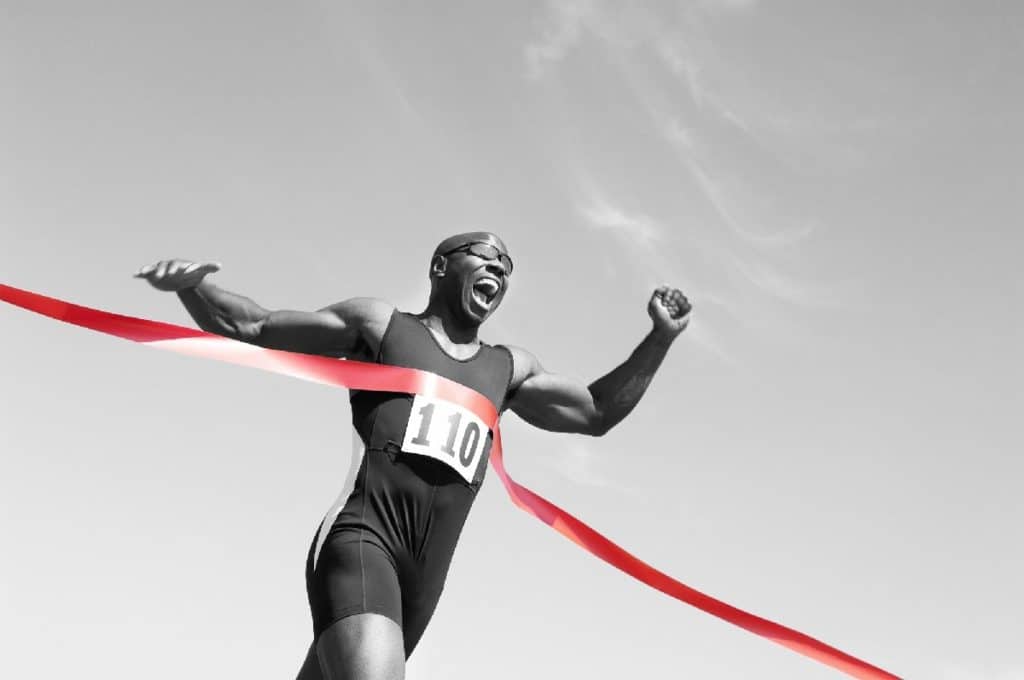
Finding an honest, concise, and substantial answer to the intriguing question, “Why is self-confidence important in sport?” can be a little challenging.
In this article, I will try to present some realistic information about developing your self-confidence to turn your sporting potential into the superior, winning performance of a lifetime.
“When an athlete exudes self-confidence, he is most likely to perform excellently in his game and win the entire competition.”
Self-confidence is one of the leading psychological factors that affect the performance of an athlete.
This gives him a sense of self-assurance to willingly accept and trust everything about himself.
On the contrary, when an athlete feels unsure or lacks the confidence to trust his potential, he cannot be his highest self. This often results in failure, burnout, and worse, depression.
What Is Self-Confidence In Sport?
Self-confidence in sport is defined as the ability of the athlete to execute a series of physical skills with ease, confidence and perfection.
It is the belief that you can effectively utilize your psychological skills to complete a sports task more efficiently.
When you are confident, you trust your skills and sporting potential completely. Pain and failure are never an option.
Another sensible definition of self-confidence in sport is the feeling of certainty that your capabilities are equal to the tasks presented in the game.
This “unshakeable sureness” can be characterized by a strong gut feeling that you will defeat all your opponents with lesser effort.
However, note that self-confidence should not equate to arrogance or rudeness. A confident player defeats his opponents with certainty and justice.
Meanwhile, an arrogant player acts as a nemesis that uses all his weapons to cheat and defeat his opponents.
Self-confidence in sports depends primarily on your perceived thoughts and emotions. This means you have the power to control your thoughts to get an excellent outcome. Let us put it this way:
When you give more focus on positive thoughts, it will be much easier for you to win the game.
Contrastingly, when you focus more on the negatives, you might instantly lose the game and wallow in self-pity.
This only implies that self-confidence is indeed a key aspect of success in sports and various aspects of life.
Why Is Self-Confidence Important In Sport?
Self-confidence greatly affects a person’s thoughts, behaviors, and emotions. Your self-efficacy or level of confidence influences how you think, behave and respond to any situation.
“Your self-efficacy or level of confidence influences the way you think, behave, and respond to any situation”
The term confidence is best defined as an individual’s belief that a certain course of action is simply the best choice and that he can execute that action correctly and to the best of his ability.
Self-confidence, on the other hand, is referred to as the set of beliefs a person holds regarding his skills, strengths, and potential.
In sports, self confidence influences athletes by motivating them to pursue their ultimate goal – winning the game.
The efforts they make depend primarily on their innate levels of self-confidence, persistence, and resilience.
Athletes that have higher levels of self-efficacy and self-confidence are most likely to show exemplary performances that increase their chances of achieving victory in the end.
When an athlete is confident, he performs excellently in the game. He exhibits a great sense of pride and contentment that radiate positive thoughts throughout the competition.
A confident athlete does not need to boast about his skills and potential in the game – he simply performs.
In the field of sports, winning is the ultimate challenge. Certainly, it matters how you utilize that self-confidence to boost your performance and show the world what you’ve got.
When you are confident, you feel mighty and limitless. You are more than willing to take the challenge and emerge triumphant at the end of the competition.
Having confidence in sports enables you to believe in your ability to complete a task or skill required in a game you choose.
While this may be bolstered by the trust and beliefs given to you, you have the ultimate power to nurture this confidence and perform your best in every situation.
The right level of confidence is based on the athlete’s capacity of executing various skills in a game. This is a result of all his preparations, planning, training, past performances, and failures.
As your level of competency grows, your confidence, too, becomes significantly and proportionately more superior.
How To Build Confidence In Sports
Want to build your self-confidence fast? Here’s how.
As stated above, building confidence in sport is never an easy task. You need to acknowledge that your level of self-confidence does not always remain constant.
This only implies that your self-confidence naturally changes several times a day.
While this might bring stress and confusion to some, building a person’s confidence in sport is measurable, realistic, and attainable.
Below are some of the many ways to improve your self-efficacy and confidence in sport:
1. Let go of fears and hesitations. Fear is an absolute psychological threat that affects an athlete’s performance.
When you are full of fear and doubts, your level of confidence significantly decreases.
The most common worries of an athlete vary from fear of not having enough skills to the fear of losing the game.
Fear not for there are ways to change this negative mindset, and keep the positive aspects of your sports potential.
First, identify all your shortcomings. You may list them down on a piece of paper or simply keep them in your memory. Acknowledge and accept these negative things about you.
But most importantly, do ways to eradicate these roadblocks to your success. This may sound cliché, but keeping a positive attitude and eradicating negativities are still effective in handling fears and hesitations.
2. Don’t compare yourself with others. You are unique and can acquire special skills that don’t apply to others. Don’t treat other players as superior or way better than you.
Being intimated by your own thoughts regarding various issues in the game is your worst enemy.
Improving confidence in sport is best achieved when you befriend yourself and treat the entire thing as healthy competition.
Help yourself and everyone to see yourselves on equal ground in terms of skills and sports potential.
Don’t be too hard on yourself – worry less, and enjoy the game.
3. Don’t hold back. The power of mindset is essential for learning, skill development, and triumph. When you have the right mindset, you deeply acknowledge the impact of training on your success.
This will boost your motivation and work ethic to perfect your skills and win the competition.
Holding back is never healthy. Don’t limit your efforts by resorting to playing safe, analyzing too much, and trying hard to be the best.
Just let it flow naturally, trust yourself, and let go of the things that hinder your way to being a champion.
4. Stop the pessimistic attitude. Simply be confident. Believe in your ability and execute the tasks to the best of your ability. It doesn’t necessarily have to be perfect.
The right levels of confidence are based on your ability to execute the skills accurately and justly. When you are confident, you worry less since you know you can perform excellently.
Stop the pessimistic attitude and motivate yourself to be better every single day.
Stop sabotaging yourself by dwelling on the negative thoughts that may lure you to doubt your capabilities, and perform poorly in the competition.
5. Set goals and evaluate your outcomes. Setting goals and evaluating the results are effective ways of improving confidence in sports.
Devise a plan – one that is realistic and measurable. This plan aims to execute the tasks or skills correctly in the game.
This is specifically beneficial once you enter the competitive phase of your journey. Your plan will help you stay focused throughout the game.
Moreover, evaluating your progress can help keep your sanity intact and stay motivated at all times, even after the competition.
Benefits Of Self-Confidence In Sport

Taking into consideration the things that are stated above, we can imply that self-confidence can provide an athlete or any person with the following benefits:
- Improved concentration and mental sharpness
- Ability to make the right decisions
- Better health and enhanced overall wellbeing
- Better sense of direction
- More active and stable emotions
- A strong sense of independence
- Having the ability to resolve internal conflicts and complex situations
- Finding satisfaction in the simple things
- Having the heart of a champion
Lack Of Confidence In Sports
Lack of confidence in sports is mainly attributed to the fear of failure, which is the biggest issue in every sports competition.
When you can’t find ways to overcome your fear of failure, you will not develop your confidence and remain stuck in a miserable state.
Find out the very reason for your fear, motivate yourself, and immediately address this issue.
An athlete who lacks the confidence to perform better in sports may demonstrate the following:
- Uncontrollable feelings of doubts, fears, and negative mindsets
- Uncontainable intimidation towards peers and opponents
- Worries too much about the outcome of the competition
- Fears of disappointing themselves and their loved ones
- Aims for perfection
- Plays safe and embraces the “victim mentality”
Why Is Self-Confidence Important In Sport: Final Thoughts
The answer to this question is simple. Self-confidence is an important indicator of an athlete’s performance in a game or competition.
A confident athlete performs excellently in front of the crowd with fewer inhibitions and the right levels of self-efficacy. He doesn’t aim for perfection – he simply performs.
Best of luck!
Related Posts:
Mindvalley Membership – Is It Worth It? (my personal experience)
The Importance Of Focus For Success and How To Make It Happen!
Why Habits Are Important To Success? (7 Crucial Reasons)
Does Meditation Help Self-Confidence?
How Do Outdoor Activities Increase Self-Confidence?
5 Effective Strategies For Building Resilience (and Managing Stress)
What Are the Factors That Affect Self-Confidence? (7 Major Factors Explained)
How Does Confidence Affect Performance?
Why Resilience Is Important For Success? (5 Crucial Reasons)
10 Confidence Building Exercises For Fast Results! (EASY)
Can Hypnosis Help Confidence? (Get Confident Fast!)
How Is Confidence Related To Resilience?






